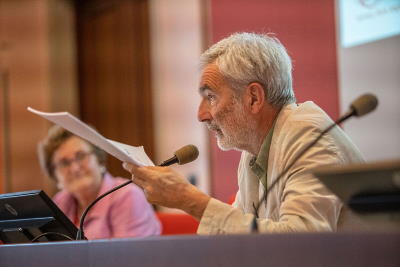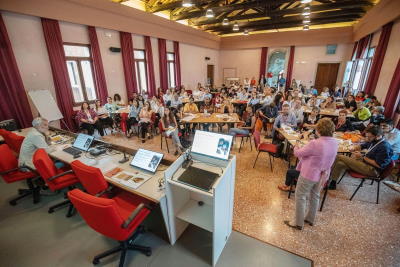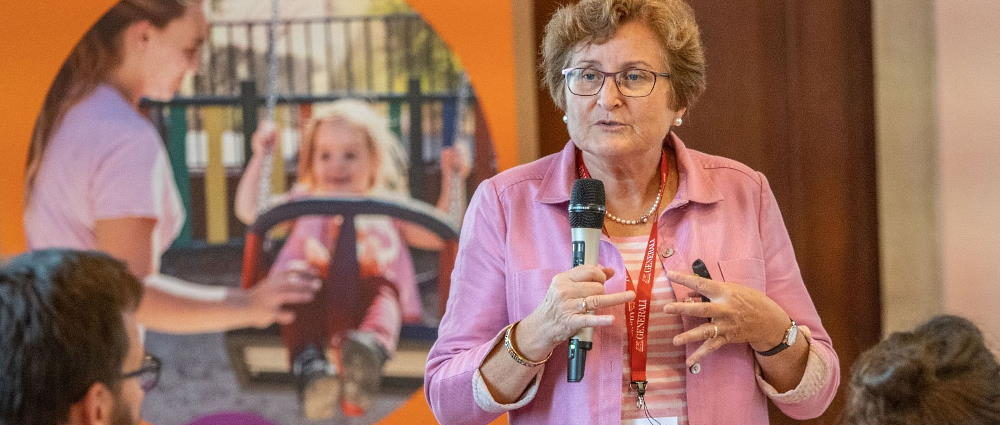18-20 September 2019 | Venice, Italy
In September 2019, The Human Safety Net (THSN) held its second Global Networks Event. The event brought together 240 people in Venice, Italy, including heads of THSN and representatives of the 40 NGOs working in 20 countries. The objectives were to connect, share and amplify the work of THSN through networking, the exchange of best practice and co-creating new initiatives together. Sessions were dedicated to ‘Unlocking the potential through empowerment’, ‘Systems thinking and the international agenda’, ‘Impact measurement in practice’, ‘Entrepreneurship’, ‘Scaling pathways and strategy’, ‘’Implementation challenges’, and ‘Design thinking for greater social impact’.
On day 1, Dr. Bernadette Daelmans (WHO) and Dr. Giorgio Tamburlini (Centro per la Salute del Bambino Onlus) co-facilitated a session for 100 participants who implement initiatives under THSN’s families and newborn workstreams. The 1-hour session was an opportunity for participants to learn about the Nurturing Care Framework for Early Childhood Development and reflect on what they could do differently in their work.
Following an introduction to the Framework, spotlights were put on responsive caregiving and opportunities for early learning, and how they relate to strengthening newborn health programming. Video materials were used to illustrate the ‘serve and return’ concept in caregiver-child interactions and to show the emotional reaction of very young infants to the affectionate voice of the caregiver. Few participants were familiar with the Framework and many expressed their appreciation for the opportunity to learn about the global work. The participants shared a number of ideas for what they could do differently in their work.
- Conduct waiting room talks and establish a playbox for moms with babies in schools
- We work with malnourished children and pregnant mothers. They are exposed to obstetric violence. I am taking away the idea of approaching local hospitals to work in partnership to support health professionals on caring better for their mothers
- Redesign next year’s program!
- Include newborns in families program
- Encourage and advocate for positive communication
- Allow children to drive communication (not just parents)
- Add sessions for parents and children to play together
- It would be helpful to have some good practice example of interdisciplinary intersectorial cooperation in implementing the framework
- Corporates and employees must be sensitized to make a policy for compulsory attendance of parents in the workshops for child care. Policy decision needs to be made.
- Happy mother happy family
- Use music and toys
- Improve detection and stimulation in vulnerable kids
- Improve healthcare access for the remote areas
- Include all fathers to participate in at least one workshop on responsive caregiving
- Communication with baby
- The interactions need to be filled with affection. How can we support caregivers when the relations/the link with the newborns is sick?
- How can we/you improve the knowledge of the caregivers to deal with their newborns needs? Lots of them did not learn this in school?
The notions of working in partnership and strengthening systems was echoed throughout the rest of the event. Messages about pathways to ownership and scale included:
- It is about the idea, not the organization that created it
- Form partnerships with a range of stakeholders including private sector
- Do not be shy, knock doors including of government, even if it seems a bit crazy
- Engage partners early and facilitate co-creation of deliverables
- Be flexible and allow for adaptation, develop a basic set of standards to ensure quality
- Collect data and document well, tell the story for advocacy and resource mobilization
- Big things start small, it is possible to grow to agenda through commitment, strategic choices, and self-effacing attitudes
- Scaling up is not only about coverage but includes quality, impact, scope (contents), and equity in the distribution of benefits
- Funding and sustainability mechanisms should consider limited central funding to ensure guidelines, training, supervision etc. combined with local funding from a variety of local partners (private, private for profit and public). This proven scheme ensures local ownership and improves sustainability.







